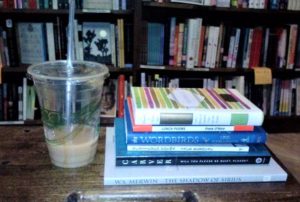 Summer ends earlier for teachers than it does on the calendar, which means that I’m now in peak anxiety season. Not about teaching, which I love. I can hardly wait to get back to the classroom and meet the new students. Instead, I am anxiously thinking about the list of projects I had hoped to complete over the summer with “time off.” Looking at my list over the weekend made me realize there’s not one damn thing I can fully cross off.
Summer ends earlier for teachers than it does on the calendar, which means that I’m now in peak anxiety season. Not about teaching, which I love. I can hardly wait to get back to the classroom and meet the new students. Instead, I am anxiously thinking about the list of projects I had hoped to complete over the summer with “time off.” Looking at my list over the weekend made me realize there’s not one damn thing I can fully cross off.
Time off is an elusive concept that I still don’t grasp. After so many jobs during my lifetime working all summer and even doubling up on jobs (the height of busy-ness was an office job and two waitressing jobs several summers in a row), I overplan what to do with unscheduled time the few weeks I’m off from school. What winds up happening is I become somewhat stupefied while being overwrought reviewing various to-do lists, now neatly organized in a bullet journal. How much easier it is to close the journal and flee the house and the dirty dishes stacked by the side of the sink. This has been a summer of drinking iced coffee with friends at coffee shops around town. Inevitably when they ask what I’ve been doing with my time, I feel a mild sense of panic thinking about all of the unfinished writing and home improvement projects I was supposed to be working on this summer. When I come home, the dishes have not washed themselves and I’m back to feeling anxious, which helps me plan my next coffee date with a friend.
I had a roommate in Boston, Ian, who once accused me of being half-assed with household chores. He pointed to the dried pine needles in the hallway. But I had hauled out the tree, I protested, missing his point. Today, piles of clothes from trying to “Kondo” my closet several weeks ago sat unmoved and unfolded on the bedroom floor. I had dragged all of my clothes out of the closet only to lose steam from the effort of destruction of what was already a pretty tidy assortment of clothes, neatly folded.
When I get back into the routine of school, I know it will be easier to compartmentalize. I only have so much time for house chores before the grading must happen or before I have to leave the house for work. Perhaps it’s easier to procrastinate when there are so many obligations to choose to avoid. Reflecting on Ian’s critique, it seems that two things are really happening. The first is a drive to perfectionism—why not try to improve an already tidy closet? I reason with myself as I fold all of the clothes again. But when I can’t do a thing perfectly in a short amount of time, the project might be abandoned until I get more energy. The clothes did get put away, but only after the cats had started nesting in them.
The second thing that I haven’t managed is what a friend calls “unstructured time.” It helps to know that others have names for these things and also struggle with them. What starts off as a day with no plans, and a sort of hopeful feeling about relaxing, becomes a stressor. While drinking a second cup of coffee I might wonder about my level of productivity which spirals into thinking I’m wasting my life away by not doing something. Why can’t I seem to ever have a “lazy” day? No matter how many articles I’ve read about the failures of multitasking and about how important it is to have these physical and mental breaks, I still feel a sense of guilt if my day isn’t scheduled down to the minute. Perhaps the solution is to not have that second cup of coffee.
On summer weekends it’s more challenging to wander around the house looking for excuses to be busy. I slowly drive my husband crazy as I bandy about, drunk on home-improvement possibilities and tiny meaningless chores (dusting the silverware drawer, organizing the detergents in the laundry closet). Maybe we can re-organize our books or refinance our home on a Saturday night. There’s not a moment to waste! I wear a path from living room to kitchen to backyard until he final says, “sit down!” or “read a book!” I tell him I’ll be done in a minute, but I am secretly plotting to reorganize the bathroom drawers when he goes back to work on Monday.
All of this busy-but-not-completing-anything hasn’t been entirely terrible. For one thing, I’ve realized my tolerance for household chaos. It is true that, after a few days, I stopped seeing the piles of clothes on the floor and only thought of them as a slight nuisance when I had to open or close the bedroom window. I got used to saying “ignore the mess” when friends came over instead of fretting about what they would think about my housekeeping skills. “Oh, you should see my place,” they would reply, and we’d laugh. And I did learn a few weeks ago that I could spend a day reading a book without any terrible consequences and that it’s easier to fight the desire to do some little chore when there are so many good words to read.
This summer has not gone according to plan, but I also wonder that I had a viable plan to begin with. Maybe my heart knew what my brain didn’t—that I needed to forget the things I was supposed to do and instead put more time and energy toward seeing friends, having meaningful conversations and reading more books. This has been time better spent this summer—measuring productivity by having a stronger sense of myself rather than by the number of chores performed. The dishes will vie for my attention the rest of the year, I’m sure.

